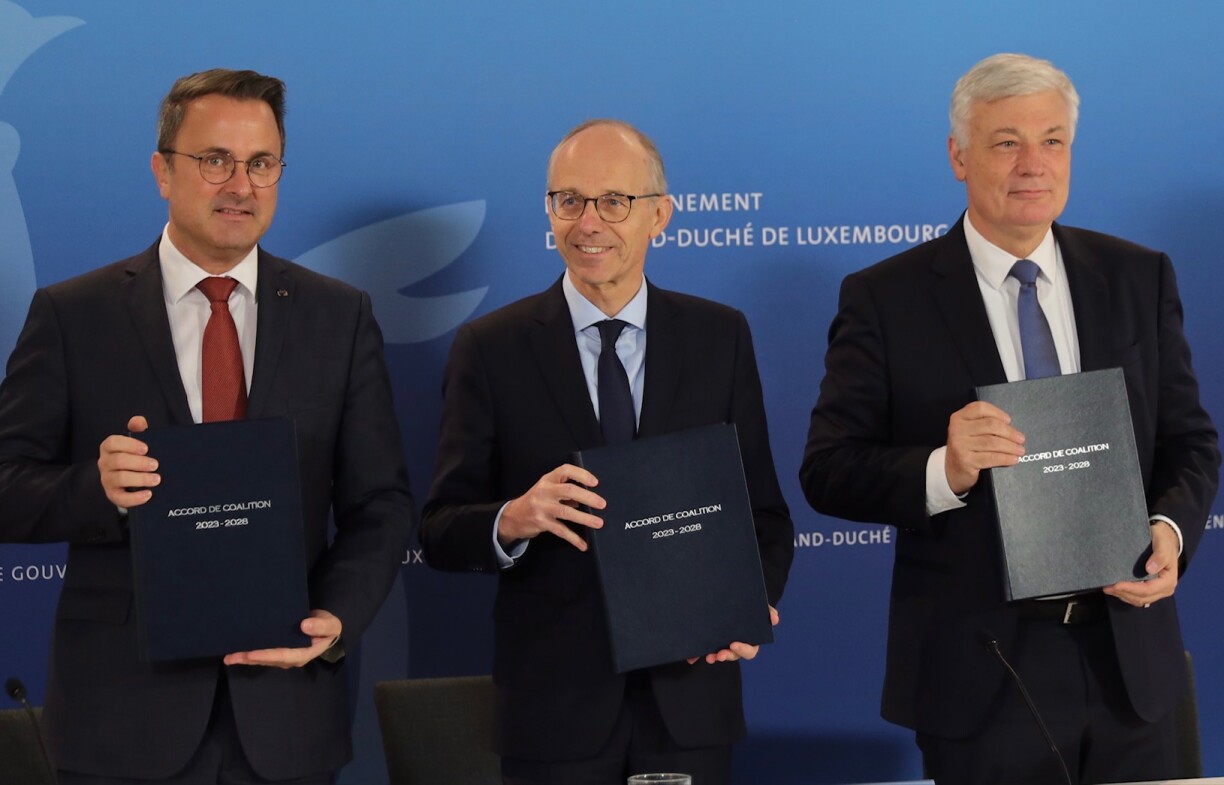
Both the Christian Social People’s Party (CSV) and the Democratic Party (DP) have agreed to the terms of the new coalition agreement, which is due to be signed on Thursday. The new government will be composed of fifteen ministers, according to the official announcement on Wednesday.
New Prime Minister Luc Frieden was joined by deputy Prime Minister Xavier Bettel and CSV president Claude Wiseler on Thursday morning to supply details of the agreement to assembled media.
After five weeks of intensive discussions, the CSV and the DP negotiated an agreement which will seek to strengthen Luxembourg’s standings and that of its citizens, Frieden said.
The two parties shared many objectives across their manifestos, particularly on purchasing power and the environment, and will seek to combine their targets with a view to preserving the economy.
The 209-page document is testament to the hard work put in over the past few weeks, Frieden explained. He emphasised that both parties rarely conflicted on points, but instead sought to work together with a view to providing a clear and concise plan for the next five years. All three representatives praised the respectful and cooperative atmosphere during the agreement discussions.
A debate is planned to take place in the Chamber of Deputies next week, in which Frieden plans to present further details on the agreement to MPs.
Once the Grand Duke has approved the creation of the new government on Friday, the first government council will take place on Monday to approve the coalition agreement. It will then be passed on to the Chamber and will be made public on Monday afternoon.
The coalition has a solid majority of 35 MPs, Frieden said, which should permit the new government to implement the agreement quickly and efficiently. Former Prime Minister Xavier Bettel acknowledged the increase in majority with a smile, and praised the pragmatism and ambition of the new agreement.
We must have a competitive economy in all sectors, Frieden said. Among the measures planned as part of the agreement are increasing support for businesses investing in renewable energies, and improving financial processes and increasing digitisation for companies and citizens alike. For businesses, taxes should be adjusted to OECD levels.
Both the DP and the CSV agreed on the need to increase citizens’ purchasing power, said Frieden. The tax table is to decrease by four indexations on 1 January 2024 to reduce the tax burden on citizens.
The coalition will also seek to address tax reforms, drawing up a project by 2026 and considering different options to reformat the tax classes.
Tax class 1A should be relieved. Taxes should not be increased, Frieden said, and the new government does not plan to introduce new inheritance taxes. The government will also introduce a “guichet sociale” to assist people who are in need of financial support, but are struggling or unable to apply for it.
The coalition also prioritises the cost of living crisis and particularly those who are living on or beneath the poverty line, Frieden said. New measures would be introduced to support and encourage jobseekers to get back in the workplace.
From early 2024, limited measures will be introduced for two years to boost the housing market and address the crisis in the construction sector. These will include reducing tax rates and increasing the “Bëllegen Akt” tax credits for buyers, among others. Both parties agree that more housing is required to ease the housing crisis, with more affordable homes and more construction, the new PM said. Deputy Prime Minister Xavier Bettel added that it was vital to distinguish between a housing crisis and a construction crisis, and emphasised the importance of cooperation with the private sector.
New projects should include 30% of affordable housing units, and private promoters should benefit from aid to encourage more affordable home construction.
The agreement also addresses the bureaucratic processes in place in the housing sector and will seek to speed these up. The government plans to introduce a new tracking system for planning permission dossiers, as well as modernising other processes at a local and national level, for example, improving the inter-ministerial interaction in terms of approving building permits.
When questioned on the cost of these measures, Frieden said the agreement did not specify the budget, but this would be considered during the creation of individual bills.
Climate policy is vital for Luxembourg, and Europe, but it should not block other projects, said Frieden. The coalition plans further “massive” investment in renewable energies, but building projects such as wind farms must become faster, he explained, as current construction is taking far too long. Other investments will include solar energy, exploring new methods to bring these systems in line with heritage and building requirements.
Other plans include extending the current infrastructure to support renewable energies.
The coalition agrees that work-life balance should be improved, particularly for young people and families. The agreement seeks to address annual leave policies to allow more time and support. Parental leave will be increased by three months, without affecting the financial aspect. Maternity leave will also be addressed to make it more flexible and to allow new parents to spend more time at home with infants and young children, without suffering a lack of social security. Bettel added that cooperation with private businesses would be key to achieving these measures.
On the subject of families, Frieden said the coalition agreement included plans to abolish discrimination in adoption law, as well as amending the law on surrogacy - although there are no plans to introduce surrogacy in Luxembourg, the amendments will target cases from abroad.
Further investment in the healthcare sector is planned as part of the agreement, as well as improving ambulatory care. The government will also invest in improving digital processes.
Frieden also highlighted plans to address policing laws, and improving the quality of childcare in Luxembourg. Above all, he emphasised the need for a modern Luxembourg, with investment in digitalisation in all sectors and fields.